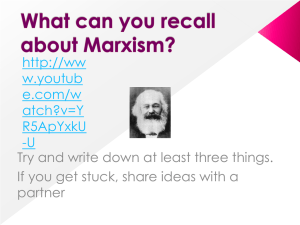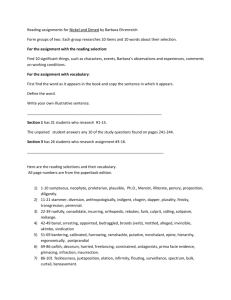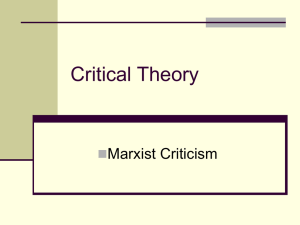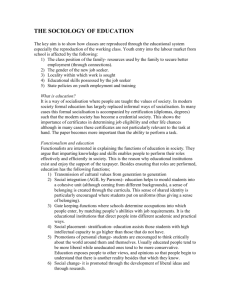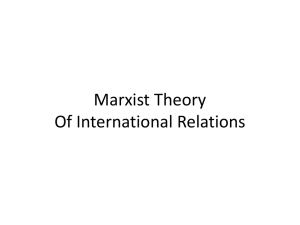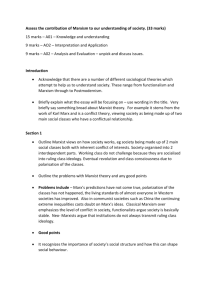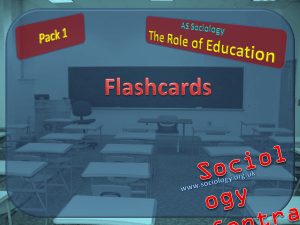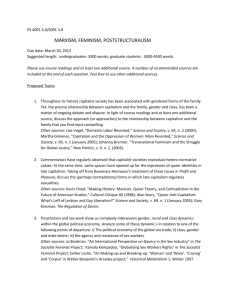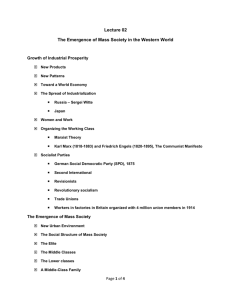Sociology of Education
advertisement
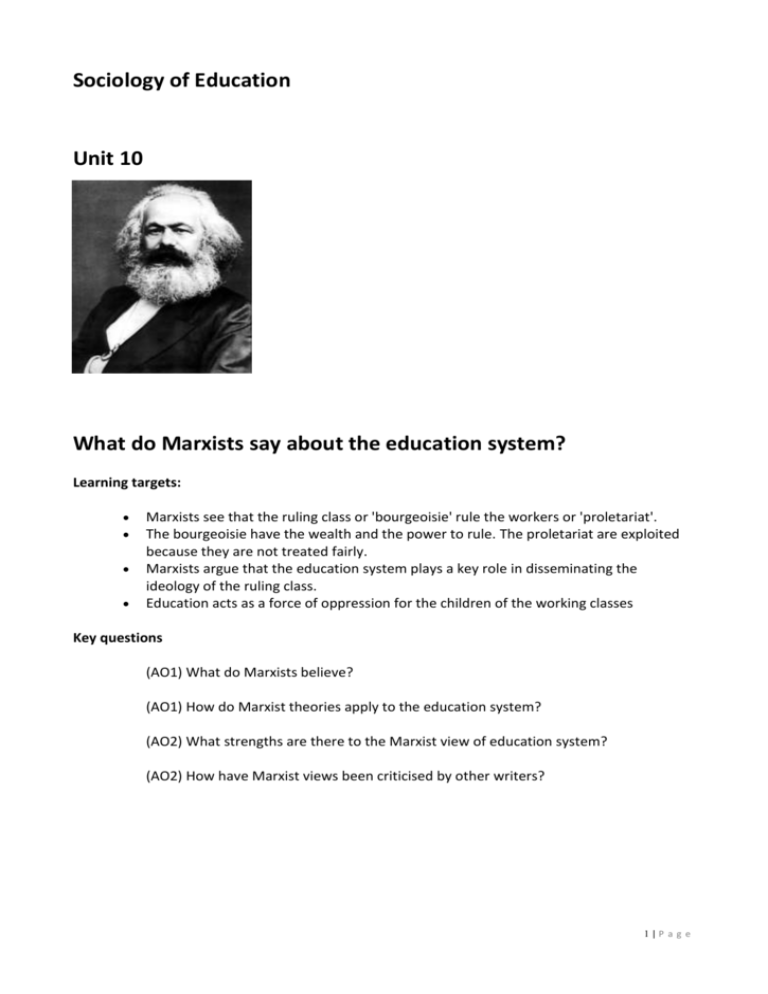
Sociology of Education Unit 10 What do Marxists say about the education system? Learning targets: Marxists see that the ruling class or 'bourgeoisie' rule the workers or 'proletariat'. The bourgeoisie have the wealth and the power to rule. The proletariat are exploited because they are not treated fairly. Marxists argue that the education system plays a key role in disseminating the ideology of the ruling class. Education acts as a force of oppression for the children of the working classes Key questions (AO1) What do Marxists believe? (AO1) How do Marxist theories apply to the education system? (AO2) What strengths are there to the Marxist view of education system? (AO2) How have Marxist views been criticised by other writers? 1|P a g e Summary of key points Marxists see capitalist society as being ruled by the economy. The minority, the ruling class or 'bourgeoisie' rule the majority, namely the workers or 'proletariat'. The bourgeoisie have the wealth and the power to rule. The proletariat are exploited because they are not treated fairly. This is the basis of class inequality. Institutions such as organised religion, the mass media, the political and the education systems all reinforce the ideology that the rich and powerful should control society. They promote an ideology or belief that our society is fair and just and that the proletariat should quietly accept capitalist society. Marxists argue that the education system plays a key role in promoting the ideology of the ruling class. Traditionally, the Labour Party has been associated with Marxist principles. It believes that the interests of the working class should be seen as important. Historically the Labour Party has been associated with policies that promote equality of access to education. The Labour Party introduced comprehensive schools, student grants and other educational legislation that made education more accessible to a wider range of people. Since the arrival of New Labour in 1997, that traditional link with Marxism has broken down. The Labour Party is much less associated with working class ideals because it has followed New Right ideas of competition and market forces in education. Nevertheless, the Labour Party in Wales has remained much more traditional than the Labour Party in London and has introduced a slightly different range of legislation that is concerned with improving education access for learners. It has abolished the unpopular SATS and made access to Higher Education cheaper for Welsh students applying to Welsh Universities. The American sociologists, Bowles and Gintis (1976), considered that the main function of education in capitalist countries is to regenerate the labour market. They proposed correspondence theory. This suggests that educational inequality mirrors the inequality of wider society. If capitalism is to succeed it must have an industrious and obedient workforce that is too divided to challenge the authority of the rulers. According to Bowles and Gintis, education supplies a workforce with the type of personality, attitudes and values that are most useful to capitalists. The education system succeeds in fulfilling this aim by means of the hidden curriculum. The hidden curriculum includes things that children learn by attending school rather than the alleged educational objectives. There is a correlation between the hidden curriculum and the needs of the workforce. According to Bowles and Gintis, the hidden curriculum moulds the workforce of the future in the following ways: In a study of 237 members of the senior year in a secondary school in New York, Bowles and Gintis showed that the grades gained had more to do with personal characteristics than academic ability. A relationship was detected between low grades and creativity whilst the higher grades were associated with reliability and punctuality. The American education system was creating an unimaginative, uncomplaining workforce that could be dealt with easily by employers. Very little control is given to students in respect of the subjects they study and the methods of study. That prepares them for the nature of the relationship in the workplace, where workers are expected to listen and obey. In capitalist society the workforce must be motivated by external rewards such as pay because the work is so dreary. The wage packet is the external reward, in exactly the same way as the external reward of 2|P a g e qualifications was the motivation in school. Bowles and Gintis allege that knowledge is divided into fragments and kept in 'neat' compartments. The approach to education corresponds to the way that the workforce is divided. Bowles and Gintis believe that jobs in factories are also divided into specific tasks to be done by different individuals. A fragmented workforce is easy to control - an example of dividing in order to overcome. Bowles and Gintis, therefore believe that the hidden curriculum provides a tolerant and obedient workforce that unquestioningly accepts authority, and is motivated by external reward and which is divided. They also argue that formal parts of the curriculum correspond to the needs of capitalist employers. They argue that education is indirectly beneficial to capitalism by legalising inequality. By making a society appear to be fair and just, it obscures the awareness of class, and safeguards the stability of society. Although education is free and open to all, and individuals can apply for jobs as they wish, Bowles and Gintis insist that some have much better opportunities than others. The children of rich and powerful people tend to gain better qualifications and better paid jobs, irrespective of their abilities. This is what the education system seeks to hide behind the myth of meritocracy. Some who are deprived of success blame themselves and not the system which has condemned them to fail. The idea that we are competing on a level playing field is a myth. Louis Althusser (1971) believed that education socialises working class children into accepting their subordinate status to the middle class. He also stated that the media, the law and religion reinforce this message and pass on an ideology or belief system, namely the ideology of the ruling class. He used the term state ideological apparatus to describe the role of these agencies. In a capitalist society, he sees education taking over as the main agency of social control. Education reproduces the attitudes and behaviour for divisions of labour. It teaches people how to accept their position, to be exploited, and to show the rulers how to control the workforce. Education prepares individuals for the world of work, and to accept their position in the capitalist society. Marxists correctly claim that the education system benefits the wealthy in society. University students are more likely to come from professional and middle class backgrounds than from the working class. This is particularly true of the old universities and those that are high in the league tables, and that have close associations with private schools. Oxford University, for example, accepts a substantial number of students from the private sector, even after considering the 'A' level results. Connor and Dewson (2001) state that only one in five higher education students came from a working class background. This partly reflects their low grades at GCSE and 'A' Level, but also that there are a number of students from working class backgrounds who have the necessary qualifications but opt not to continue to higher education. This supports Marxist ideas that the education system is elitist. A survey of 2000 young people demonstrated that students from the working class showed more interest in jobs and financial matters than middle class students. Some of the most common reasons given for not considering higher education level were - wanting to start working, wanting training and to work at the same time, wanting to be independent, they were aiming for a job that did not require being highly qualified, and they were concerned about the cost, namely of student loans and the fear of not being able to repay the debt. This evidence can be used to support correspondence theory in that working class children are socialised into not challenging middle class power over education and the myth of meritocracy. 3|P a g e However, the people who experience the most discrimination in Marxist terms are women and members of ethnic minorities. Yet it is these who are the two groups who are increasingly attending universities. The work of Bowles and Gintis is considered to be extremely controversial, and it has been criticised by Marxist critics and others. Critics agree that Bowles and Gintis over-emphasise the correlation between work and education and that they have failed to provide adequate evidence. A number of points have been made by their critics. The education system was established much later than the beginning of the industrial period. For a long time, industrialists were employing an uneducated workforce and thriving. This weakens the alleged relationship between education and economic development. Insufficient research was undertaken to the allegation that schools had an effect on personality. Detailed research into life in schools was not undertaken, whilst admitting that the hidden curriculum in fact was influencing pupils. Other research suggests that little attention is paid to school rules by many pupils, and their respect for teachers is minimal - in contrast to Bowles and Gintis' idea of a docile workforce for the future. Bowles and Gintis were criticised for ignoring the influence of formal education. Reynolds insists that it is not the objective of the curriculum to develop a workforce that is obedient. Pupils are taught to appraise and question, to know about social and political matters. In a study of workers in England by Richard Scase, only 2.5% were of the opinion that educational qualifications were an important factor in deciding social class. This does not suggest that education has succeeded in legalising inequality in Britain. According to David Reynolds, it would be impossible for British capitalists to completely rule schools. Local authorities have a great deal of freedom in the matter of organising education. Teachers do have freedom within the classroom. The Bowles and Gintis research was completed in the 70s. Since then, there have been many changes to the education system which suggests that their assumptions could be more relevant today. Local authorities lost some of their power and control over education, for example, by the establishment of grant-maintained schools; teachers lost their freedom as a result of the national curriculum; and there has been a growth in vocational training. The Marxist, Henry Giroux, sought a new analysis, following the criticisms made of Bowles and Gintis. He claimed that pupils from the working class participated in designing their own education. They do not accept everything they are taught. They take advantage of their own culture to find ways of responding to the school - often by opposition (anti-school subculture). 4|P a g e What should you have in your folder of notes on this topic? (AO1) Definitions of the key concepts Correspondence theory Ideology Repression Proletariat Bourgeoisie Bourgeois hegemony Capitalism Ideological state apparatus Hidden curriculum Cultural capital Independent study Compulsory A PowerPoint presentation explaining Marxist theories of the social system Notes on each of the writers in these notes, summarised to 50 words or fewer. Evidence of personal research from a textbook explaining Marxist approaches towards education. Extension work Write a short essay to the title: Outline and assess Marxist theories of education. Find out about one or more of the following Marxist writers and add notes or annotated downloads to your folder: Karl Marx Louis Althusser Pierre Bourdieu Antonio Gramsci Jurgen Habermas 5|P a g e Useful websites and sources of information (AO1): You should use the website of the NgfL Cymru and look at the ebook to develop your notes http://www.ngfl-cymru.org.uk/eng/sociology-as-ebook Karl Marx's life and influence are summarised here http://www.bbc.co.uk/history/historic_figures/marx_karl.shtml Summaries of Marxist thinking http://sixthsense.osfc.ac.uk/sociology/as_sociology/marxism.asp http://www.infed.org/thinkers/et-marx.htm http://www.sociology.org.uk/ffmarx.doc http://www.sociology.org.uk/tmmarx.pdf http://www.mrthirkill.com/resources/marxism.doc There is an activity lesson on this website that should ensure your notes are good: http://www.educationforum.co.uk/sociology_2/basesuper.htm There is material that could be very useful on the pages of the Earlham Sociology pages http://www.earlhamsociologypages.co.uk/edtraintitle.htm Really detailed Marxism can be seen at http://www.marxism.org.uk/ 6|P a g e AO1 Knowledge and understanding Who was Karl Marx? What do Marxist believe about society and how it is structured? What do Marxists believe about education? What is the link between the Labour Party and Marxism? Explain what Bowles and Gintis suggest with correspondence theory. What are the strengths of Marxist thinking about schools and education? What weaknesses are there to Marxist views of the education system? 7|P a g e Outline and assess Marxist theories of education. Outline Marxism in general What do Marxist theorists say about education? What are the strengths of the Marxist view of education? What are the weaknesses of the Marxist view of education? Summative conclusion: What does Marxism add to our understanding of the education system of the UK? 8|P a g e Discuss sociological explanations for why we have an educational system. Key terminology for the essay (AO 1) Marxism, Functionalism, meritocracy, social control, socialisation, ideology, hidden curriculum, ladder of opportunity What is formal education? What are the historical reasons to explain why we have an education system? What do Functionalists say about the reasons for the education system? (refer to writers) What are the strengths and weaknesses of the Functionalist point of view? (refer to evidence) What do Marxists say about the reasons for an education system? (refer to writers) What are the strengths and weaknesses of the Marxist point of view? (refer to evidence) In conclusion, which point of view has the strongest arguments to support it? 9|P a g e
